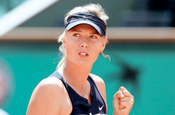Tennis is one of few sports in which women competitors have brand value that equals or exceeds that of men, and 21-year-old Sharapova has amassed personal deals with brands including Canon, Gatorade, Nike, Land Rover, Parlux Fragrances, Prince, Tag Heuer and Tropicana.
'Tennis is an interesting case study in terms of the commercial potential of women's sport,' says Alun James, managing director at Four Sports marketing & sponsorship. 'This was brought into focus last year when all the Grand Slams offered equal prize money to women and men for the first time. The WTA Tour was sponsored by Sanex, which is primarily a women's toiletries brand, and is now sponsored by Sony Ericsson, which has a product portfolio that encompasses both sexes.'
With the men's arena becoming cluttered, is there a viable opportunity for brands to achieve standout by sponsoring women's sport? 'Rights-holders for women's sports could make a much better case by highlighting their vision and audience,' says Tim Crow, chief executive of sponsorship agency Synergy. 'Too many opportunities are lacking in differentiation versus the male equivalents, even though there are some really interesting territories in women's sport.'
Few British women have attracted blue-chip sponsorship deals, with the notable exception of Paula Radcliffe and Dame Kelly Holmes. 'Right now there is a dearth of outstanding sportswomen who can cut across mass markets,' says Steve Martin, chief executive of M&C Saatchi Sports & Entertainment.
The UK does have some potential stars, however. While England's men's rugby and cricket teams have struggled of late, their female counterparts are reigning Grand Slam and Ashes holders respectively. England's women footballers, meanwhile, are top of their qualifying group for Euro 2009, in stark contrast to the men's team's failure to qualify.
Football dominates sports marketing globally, and while the women's game is still something of a minority spectator sport in the UK, a record crowd of more than 24,500 watched Arsenal Ladies beat Charlton Ladies in the FA Women's Cup final last month. Brazilian footballer Marta is the shining light of the international women's game, and has an endorsement deal with Puma.
However, according to Richard Thompson, chairman of sports and entertainment talent managers Merlin Elite, the key to commercial viability rests with broadcasters. 'The FA invests in female participation, but ultimately everything is determined by TV rights. Without their interest, there will never be serious income in the women's game.'
The success of the sport in Germany, however, suggests that there may be some hope. In 2007, 9.1m viewers watched the German women's team become world champions in a final aired by national broadcaster ZDF - more viewers than had watched Bayern Munich play AC Milan in the Champions League a year earlier, in the game that attracted the German club's biggest TV audience of that season.
If grassroots support is not enough to attract them, sponsors' heads may be turned by women in sports that pit them directly against men. However, the experience of golfer Michelle Wie, who has competed on the men's tour, should act as a warning, says Martin. 'Wie spoiled herself trying to transcend the divide, but she has missed every cut. Only success breeds success.'
He concedes that a different story has unfolded in the world of motorsports, where even the reddest-necked of petrolheads has come to respect Danica Patrick, who in April became the first woman to win an IndyCar race.
While women's sport is unlikely to eclipse men's in popularity, with the men's arena growing cluttered and professionalism among sportswomen on the rise, sponsorship directors seeking the next Ronaldo, Woods or Hamilton may one day ask, 'Where can I find the next Marta, Wie or Patrick?'
Maria Sharapova Tennis
The former Wimbledon champion's sponsors including Tiffany & Co, Sony Ericsson and Colgate.
Marta Vieira da Silva Football
The reigning FIFA Women's Player of the year endorses Puma.
Danica Patrick IndyCar
The first woman to win an IndyCar race and tipped to be the first woman driver in Formula One, Her sponsors include Tissot and Samsonite.
Michelle Wie Golf
The golfer has deals with Nike, Sony and Omega, and has disapp-ointed since turning pro in 2005, but at just 19, her future may well be bright.
Will major brands ever back female athletes with big-money investment?


